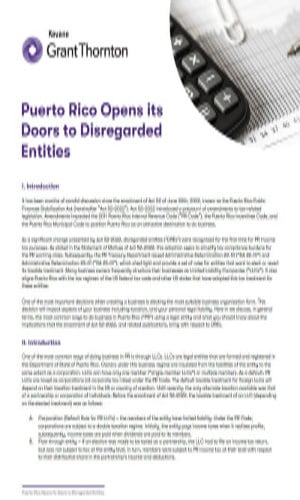-
Financial statements audits
Financial statement audits
-
Compliance audits
Compliance audits
-
Compilations and reviews
Compilations and audit
-
Agreed-upon procedures
Agreed-upon procedures
-
Tax compliance
Business Tax
-
Global mobility services
Through our global organisation of member firms, we support both companies and individuals, providing insightful solutions to minimise the tax burden for both parties.
-
Sales and use tax and indirect taxes
SUT/ VAT & indirect taxes
-
Tax incentives
Navigating the complex landscape of tax incentives in Puerto Rico can be challenging. Whether you're looking to benefit from the Export Services Act (Act 20), the Individual Investors Act (Act 22), or other incentives under Act 60, we provide tailored advice to help you maximize your tax benefits and ensure compliance. Let us help you unlock the potential of doing business in Puerto Rico.
-
Transfer Pricing
The laws surrounding transfer pricing are becoming ever more complex, as tax affairs of multinational companies are facing scrutiny from media, regulators and the public

-
Business consulting
Our business consulting services can help you improve your operational performance and productivity, adding value throughout your growth life cycle.
-
Business Risk Advisory
Risk is inevitable but manageable. We deliver relevant, timely and practical advices to aid organizations manage risk and improve business performance. We can help you identify, understand and manage potential risks to safeguard your business and comply with regulatory requirements.
-
Technology Advisory
We provide comprehensive solutions to safeguard your business and ensure operational resilience and compliance. Our expert team offers a range of technology advisory services designed to address your cybersecurity needs, enhance business continuity, and manage security effectively.
-
Transactional advisory services
Transactions are significant events in the life of a business – a successful deal that can have a lasting impact on the future shape of the organizations involved. Because the stakes are high for both buyers and sellers, experience, determination and pragmatism are required to bring deals safely through to conclusion.
-
Forensic and investigative services
At Grant Thornton, we have a wealth of knowledge in forensic services and can support you with issues such as dispute resolution, fraud and insurance claims.

It has been months of candid discussion since the enactment of Act 52 of June 30th, 2022, known as the Puerto Rico Public Finances Stabilization Act (hereinafter “Act 52-2022”). Act 52-2022 introduced a potpourri of amendments to tax-related legislation. Amendments impacted the 2011 Puerto Rico Internal Revenue Code (“PR Code”), the Puerto Rico Incentives Code, and the Puerto Rico Municipal Code to position Puerto Rico as an attractive destination to do business.
As a significant change presented by Act 52-2022, disregarded entities (“DREs”) were recognized for the first time for PR income tax purposes. As stated in the Statement of Motives of Act 52-2022, this adoption seeks to simplify tax compliance burdens for the PR working class. Subsequently, the PR Treasury Department issued Administrative Determination 22-10 (“DA 22-10”) and Administrative Determination 23-01 (“DA 23-01”), which shed light and provide a set of rules for entities that want to elect or revert its taxable treatment. Many business owners frequently structure their businesses as Limited Liability Companies (“LLCs”). It also aligns Puerto Rico with the tax regimen of the US federal tax code and other US states that have adopted this tax treatment for these entities.
One of the most important decisions when creating a business is electing the most suitable business organization form. This decision will impact aspects of your business including taxation, and your personal legal liability. Here in we discuss, in general terms, the most common ways to do business in Puerto Rico (“PR”) using a legal entity and what you should know about the implications that the enactment of Act 52-2022, and related publications, bring with respect to DREs.
II. Taxation of LLCs in Puerto Rico Pre- 2022 legislation
One of the most common ways of doing business in PR is through LLCs. LLCs are legal entities that are formed and registered in the Department of State of Puerto Rico. Owners under this business regime are insulated from the liabilities of the entity to the same extent as a corporation. LLCs can have only one member (“single-member LLCs”) or multiple members. As a default, PR LLCs are taxed as corporations (at corporate tax rates) under the PR Code. The default taxable treatment for foreign LLCs will depend on their taxation treatment in the US or country of creation. Until recently, the only alternate taxation available was that of a partnership or corporation of individuals. Before the enactment of Act 52-2022, the taxable treatment of an LLC (depending on the elected treatment) was as follows:
A. Corporation (Default Rule for PR LLCs) – the members of the entity have limited liability. Under the PR Code, corporations are subject to a double taxation regime. Initially, the entity pays income taxes when it realizes profits, subsequently, income taxes are paid when dividends are paid to its members.
B. Flow through entity – If an election was made to be taxed as a partnership, the LLC had to file an income tax return, but was not subject to tax at the entity level. In turn, members were subject to PR income tax at their level with respect to their distributive share in the partnership’s income and deductions.
III. In-Depth Look at DREs in Puerto Rico
A. What are disregarded entities?
A DRE is a legal entity separate from its owner and ignored for income tax purposes. Disregarded entities are single-member LLCs. Prior to the enactment of Act 52-2022, except for entities recognized as disregarded entities for US federal income tax purposes that have a tax exemption grant for Priority Projects in PR, disregarded entities were not recognized for PR income tax purposes. As a result, entities that were disregarded for income tax purposes in the US or other country did not receive the same tax treatment in PR. This complicated the taxation of the entity for PR purposes and could represent a disadvantage when compared to other jurisdictions. DREs were adopted by PR legislation with the purpose of offering business owners the opportunity to have the legal protections granted by limited liability companies with simpler compliance requirements. We should note that DREs are disregarded solely for income tax purposes. Consequently, the entity is still required to obtain an employer identification number and may be subject to other taxes and compliance obligations.
B. What entities are eligible to be treated as a DRE in Puerto Rico?
PR and foreign single-member LLCs are eligible to be treated as DREs for PR income tax purposes. For PR LLCs, the owner must be an individual (US citizen or foreign) resident of PR. For these purposes, a married couple under the community property regime will be considered a single taxpayer. The DA 22-10 also clarifies that an LLC can be treated as a DRE even though it is owned or part of a chain of DRE owners as long as the ultimate owner is a PR resident individual. As a result, an entity owned by a passthrough entity or that must file an income tax return can never be treated as a DRE. A PR LLC can be treated as a DRE starting 2022.
Starting in 2023, non-PR LLCs can be treated as passthrough entities or DREs in PR if they are treated as a DREs in the US or their respective foreign country. Foreign LLCs are not required to be owned by individuals. The DA 22-10 clarifies that from 2023 onwards, if a foreign LLC is treated in PR as a passthrough entity, it may choose to be treated as a DRE but is not required to do so, despite being a single-member entity or having a US DRE election.
C. Advantages of disregarded entities
i. Simplified tax compliance- One of the biggest advantages of electing to be treated as a disregarded entity is that no separate income tax return must be filed for the entity. All the income, expenses, gains and losses from the entity are reported in the owner’s income tax return. As a result, compliance costs are decreased.
ii. Lower tax rates than corporate entities- Compared to their corporate counterparts, disregarded entities avoid the effects of double taxation tied to corporations. In addition, taxable income arising from the operations of the disregarded entity is taxed at the owner’s level, which may be taxed at lower tax rates than corporate entities.
iii. Legal protection- Disregarded entities are only ignored for income tax purposes. Since these entities are formed as LLCs, the entity is a separate legal person and the owner’s liability is limited to the assets in the entity.
D. Disadvantages of disregarded entities
i. The entity is limited to one owner- Disregarded entities are limited to only one owner which can limit structuring options. LLCs with more than one owner are not eligible to be treated as a disregarded entity.
ii. Ability to raise capital is limited- Since disregarded entities are limited to only one owner, the entity cannot issue additional participation as means of obtaining capital, as a result, the procurement of capital is limited to the capital contributed by its sole member.
E. Electing to be treated as a DRE
i. Election
DA 22-10 emphasizes that as a rule, it will be optional for an LLC to be treated as a DRE. The DA 23-01 sheds guidance on the transitory rules applicable to entities that may qualify for DRE treatment. It establishes that every entity is subject to taxation under the default treatment unless it elects otherwise. The chosen treatment for an entity’s first taxable year will be considered its Original Classification. An entity can change its Original Classification by filing Form AS 6045 with its timely filed tax return for the taxable year in which the change will be effective. An election made by an entity in its first year of organization or operations in PR (in the case of a foreign entity) will not be considered a Classification Change. However, a Classification Change will apply to corporations that convert legally to an LLC under the Corporations Law if they have filed tax returns as "corporations" in previous taxable years and upon converting choose the pass-through entity treatment or the disregarded entity treatment.
For any eligible limited liability company to be treated as a disregarded entity, the owner of the entity must file an election by submitting Form AS 6045 and include it electronically as evidence on its individual income tax return on or before the due date, including extensions of the income tax return for the year in which such election will be effective. Failure to timely submit Form AS 6045 will result in the entity being under its default tax treatment. This contrasts with the US tax system, which considers single-member LLCs disregarded entities by default. For the year of DRE election, single member LLCs are encouraged to submit a protective extension to file the PR income tax return at the entity level to shield them from any penalties and notifications that may be automatically issued by the PR Treasury by not identifying a return by the entity’s statutory deadline. Although these may be inapplicable, filing the extension could avoid a future unpleasant situation of requesting the PR Treasury the removal of the penalty. As a reminder, the pertinent elections in the taxable treatment must be notified through a duly filedForm 6045 and must not be mistaken by the taxable treatment designated in SURI when registering the entity in the platform.
ii. Tax Effects Associated with Entity Conversions
The following table summarizes the tax effects associated with entity conversions to and from DRE:
|
Original Tax Treatment |
New Tax Treatment |
Tax Effect |
|
Passthrough Entity |
Disregarded Entity |
1) Liquidation of the passthrough entity |
|
Corporation |
Disregarded Entity |
1) The corporation’s assets and liabilities are distributed to the entity’s owners in a liquidating transaction. ^ There is the assumption that the owner continued the business at the personal level. ^ Only applicable to LLCs taxable as corporations |
|
Disregarded Entity |
Passthrough Entity |
1) Capital contribution to a new passthrough entity |
|
Corporation |
1) Capital contribution to a new corporation |
Any tax conversion for which the effective date is not the last day of the taxable year of the taxpayer is subject to rules for short-period tax returns.
Before electing to be treated as a disregarded entity, consideration of the conversion costs that may be associated with such election. Conversion costs depend on the type of entity from which the conversion takes place.
F. Tax Reporting in PR
The disregarded entity will not be required to file a separate income tax return, instead, the owner of the entity will be required to report income, expenses, gains and losses arising from the operations of the disregarded entity in his income tax return. The operations of the disregarded entity will be reported in the respective schedule (such as schedule J, K, L, M y N) as if the operations were held by the individual taxpayer in his personal character. For taxable year 2022 forward the schedules used to report income, expenses, gains, and losses have incorporated a checkbox that must be checked if the schedule will be completed with respect to a disregarded entity. In addition, if an individual holds more than one disregarded entity, a separate schedule must be prepared for each entity.
A volume of business detail must be submitted as part of the tax return of the owner of the DRE. The audited financial statement requirement will be determined at the entity’s owner level.
Although the entity is ignored for income tax purposes, the entity is required to file and pay all other tax returns for which business entities are responsible (I.e., municipal license taxes, property taxes, employment taxes, among others). Furthermore, it will still be required to file informative returns, make withholdings, have a Merchant Registry under its name, and report and collect Sales and Use Tax.
G. Open questions
Since Act 52-2022 was recently approved, there are questions and concerns regarding its application, implementation, and convergence with other PR legal provisions. Some unresolved questions include:
i. What happens to a disregarded entity owned jointly in marriage and such marriage is ruptured by means of divorce?
ii. What happens to a disregarded entity when its owner is deceased and there is more than one heir?
iii. How will certain deductions be allocated for taxpayers owning several DREs (i.e., self-employment tax)?
iv. Will the ownership limitations set to PR LLCs (compared to foreign LLCs) raise constitutional issues?
These unresolved questions are likely to be cleared shortly. However, since DREs have been long established in the US Tax Code some of these issues may have been already resolved therein and may be used in PR as a reference, to the extent that applicable dispositions of the PR and US Tax Codes are similar.
IV. Bottom Line
The introduction of disregarded entities to the PR Code presents new tax planning opportunities for businesses operating in Puerto Rico. Disregarded entities offer tax structuring opportunities that were not available prior to the enactment of Act 52-2022. Careful consideration should be taken when determining the appropriable structure for your business. Our team of tax professionals can assist you in determining if a disregarded entity is the right choice for your business structure.
Collaborators:
Samira Yassin, CPA, Esq. - Tax Manager
Madeleine Tubens, CPA, Esq. – Tax Manager
Frederik de Jong, MBA – Tax Senior


